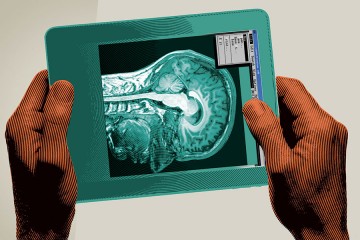A team of Johns Hopkins undergraduate students and faculty is developing a wearable device intended to improve care for patients with cystic fibrosis, a genetic disease in which mucus build-up can result in lung infections, nutritional deficiencies, and respiratory failure.
The condition is also marked by abnormally high levels of chloride in patient sweat, the detection of which can confirm a diagnosis. New drugs that treat the protein defect that causes cystic fibrosis symptoms also lower the chloride levels found in patients' sweat, meaning chloride detection can be used to monitor patients' response to treatment and to track their compliance.
The Hopkins team hopes to make chloride monitoring—which traditionally uses sweat tests performed in specialized centers—more accessible to cystic fibrosis patients. The lab of Peter Searson, professor of materials science and engineering at Johns Hopkins and a faculty advisor on the design team, has miniaturized the sweat test technology to create a prototype wearable device that measures chloride levels in sweat.
The goal is to develop a bracelet that can be worn at work or at home and can record measurements of chloride over time, eventually replacing sweat test machines. The device is part of a larger health industry trend of incorporating mobile technology into diagnosis and treatment.
"In medicine, we don't change testing methods that are working until we really need something new," says Garry Cutting, professor of medical genetics and pediatrics at Johns Hopkins and the other faculty advisor on the design team. "This device will help us measure the status of an individual with cystic fibrosis much better."
The students on the team—led by senior Jeanette Ortega, a materials science and engineering major—are working to ensure the data collected by the device is accessible in real time by patients and clinicians. The team is also determining how to transmit readings from the device to smartphones and developing a user-friendly interface for the device and related apps.
Though the student design team had to overcome early barriers in figuring out wireless data transmission, they are highly driven to succeed.
"Once we started doing research into cystic fibrosis, it hit all of us how big of a deal this project is," Ortega says. "Knowing that something we're doing can impact a lot of lives in an important way really helps to motivate us to continue working on the project."
The successful development of this wearable chloride test has implications for individualizing cystic fibrosis care, a goal Searson and Cutting share. Both work with the Johns Hopkins Individualized Health Initiative—also known as Hopkins inHealth—an initiative committed to developing health tools designed to tailor patient care. Searson is a co-director of Hopkins inHealth and Cutting received seed funding to develop an individualized cystic fibrosis (inCF) project.
"We're moving to an individualized phase of medicine where we're going to measure, sometimes repeatedly, substances in our bodies so that we can optimize health outcome," Cutting says.










